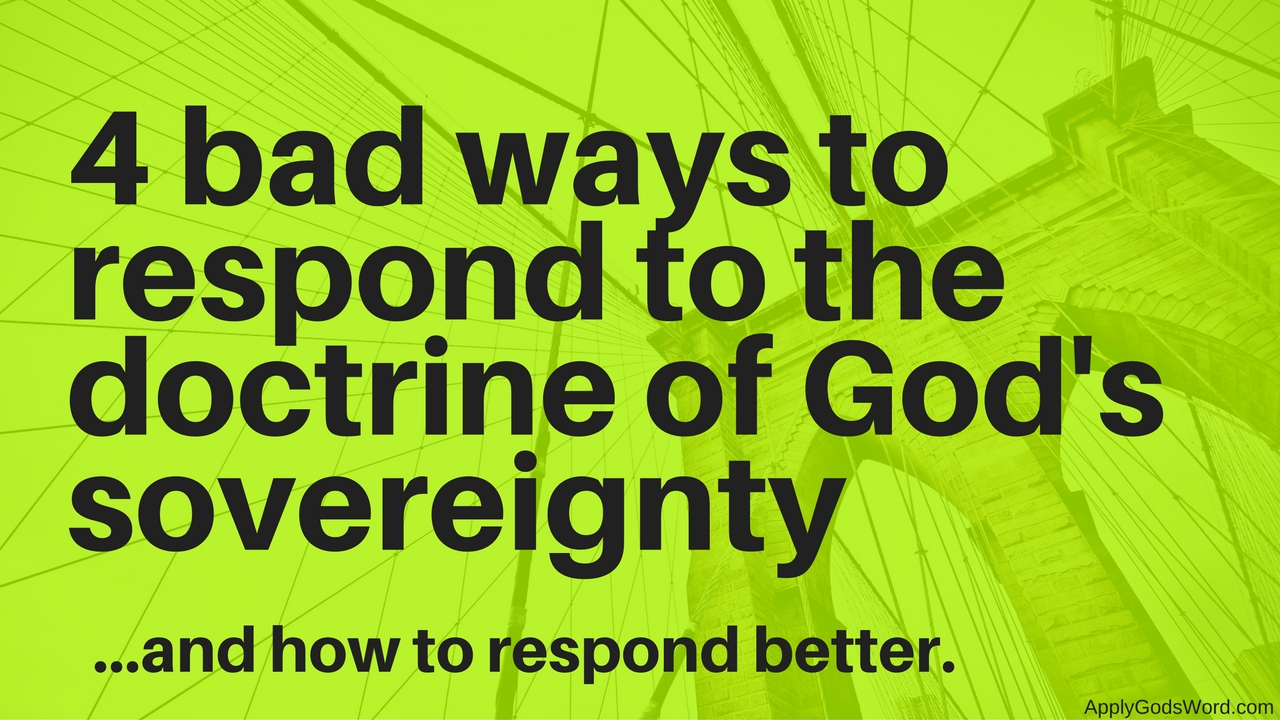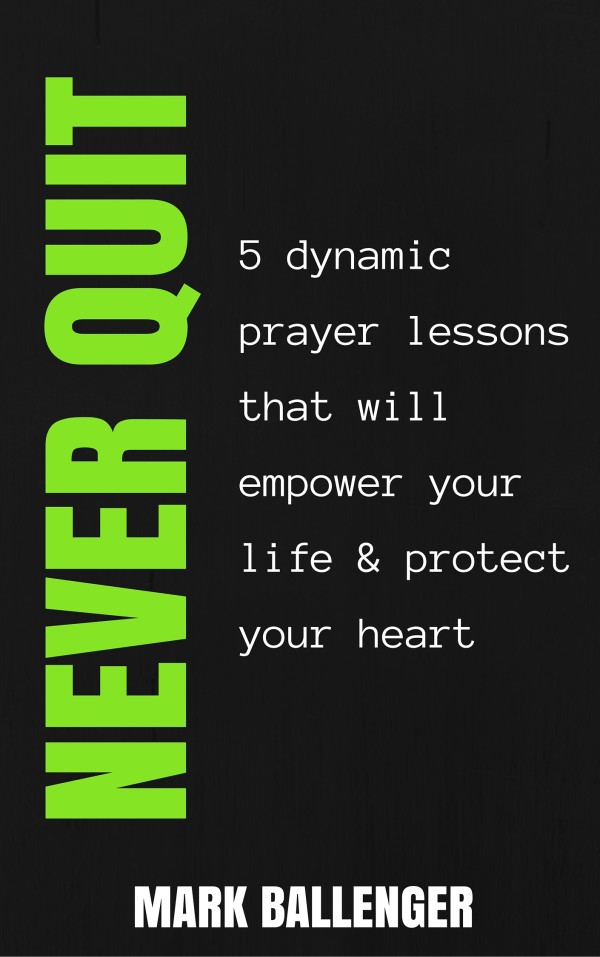
Agreeing on one definition and explanation regarding the sovereignty of God is not going to happen amongst all Christians.
An Arminian and a Calvinist or a Charismatic Christian and Reformed Christian are simply not going to agree on the finer parts of theology, though we should all be united around the gospel of Jesus Christ.
There is one biblical truth, but in our sinfulness and limited knowledge, humans will always struggle with grasping God’s Scriptures perfectly, especially when it comes to difficult doctrines like the sovereignty of God.
While agreeing on all the finer points of how God’s sovereignty actually operates is impossible amongst different theological camps, a slightly easier task should be agreeing on a right response to the sovereignty of God. While the Bible is certainly the place to look if you want to form doctrines and beliefs, it is also the place to look when we need to know how to live and actually serve God with our actions.
The Bible not only teaches us about the sovereignty of God and what it is, perhaps more importantly, it also teaches us how to rightly respond to God’s omnipotence.
So here are 4 of the most common ways to rightly and wrongly respond to the sovereignty of God.
1. God’s Sovereignty and Evangelism
Wrong Response: Because God is sovereign, evangelism is not that important.
Right Response: Because God is sovereign, I will evangelize more.
One side says God must elect someone so that person can make a decision to become a Christian. The other side says those who choose to make that decision are God’s elect. It’s an important debate, so I’m not minimizing the study of this topic.
But what often gets lost in all the debating is the biblical response to the sovereignty of God. No matter what you believe about predestination, the Bible commands us all to share the gospel with the world. The fact that God is in control must never make us lazy in our witness. In Matthew 28:18-20 (MEV), Jesus said,
All authority has been given to Me in heaven and on earth. 19 Go therefore and make disciples of all nations, baptizing them in the name of the Father and of the Son and of the Holy Spirit, 20 teaching them to observe all things I have commanded you. And remember, I am with you always, even to the end of the age.” Amen.
Jesus has all the authority. God is sovereign. “Therefore” we are called to go and make disciples. Debate what sovereignty means all you want, but the response to God’s power is plain and simple when it comes to evangelism – “Go.”
Our job is to obey God’s plan, not diagram it on a chalk board. And God’s sovereign plan is for Christians to share their faith. There’s no debating that.
2. The Sovereignty of God and Human Participation
Wrong Response: God’s will is always done, therefore it really doesn’t matter what I do.
Right Response: God will do whatever he desires, and he desires me to actively participate.
Put simply, there are two ways the Bible primarily talks about the “will of God.” There is God’s ultimate will, which means the end result of human actions in this universe are going to be what God wants (Acts 2:23). And then there’s God’s prescribed will, meaning the commands in Scripture God gives us the freedom to obey or disobey (Luke 7:30). The debate typically revolves around the former. The later, however, is what is in our control.
Is God going to accomplish whatever he wants to accomplish? You bet! But nowhere in Scripture does this give humans a free pass on participating. Because God is in control should cause us to work harder than ever, trusting the whole time that although we are called to act and obey his prescribed will, God is the universal decision maker and his ultimate will is going to be accomplished.
3. The Sovereignty of God and Sanctification
Wrong Response: God is the only one who can empower me to do good, therefore it’s really not my fault I keep sinning and messing up because he has not given me all that I need to succeed.
Right Response: God is in me, giving me the power to do good, therefore it’s always my fault when I keep on sinning and messing up because he has given me all that I need to succeed.
God is the only one who can fill us with his Spirit, empowering us to accomplish his will (John 15:5, Romans 8:8-9). But just because God alone has the ability to empower us does not mean we are powerless in the process of sanctification.
Philippians 2:12-13 (ESV) explains, “. . . work out your own salvation with fear and trembling, 13 for it is God who works in you, both to will and to work for his good pleasure.” The phrase to “will and to work” means God gives us the “desire and power to do what please him” (Philippians 2:13, NLT). He gives us the right inner motivation and he gives us the ability to obey.
And Philippians 2:12 explains that because God is in us, we must “work out [our] own salvation.” Because God is working in the Christian is the reason we must sin less and grow more. The fact that we can do nothing without Christ should never be used as an excuse for our sin. God’s grace is now the reason the Christian has no excuse left (Romans 6:1-4). Because his Spirit is in us, we are now responsible to continue down the path of sanctification more and more every day.
4. The Sovereignty of God and Prayer
Wrong Response: God is in total control, so it really doesn’t matter if I pray or not.
Right Response: God is in total control, so I should pray all the time.
Prayer makes no sense if God is not all powerful. If God can’t soften people’s hearts, bring about his will, or heal people’s diseases, then to pray about such things makes no sense. The temptation, however, is then to overstate this idea and argue that our prayers don’t matter since God is in total control anyway.
Just before Jesus taught us the Lord’s Prayer, he said this in Matthew 6:8-9 (MEV), “. . . for your Father knows what things you have need of before you ask Him. Therefore pray. . . .” God knows what we need before we even ask and has the power to accomplish anything he wants. Because of this fact, Jesus said, “Therefore pray.”
The doctrine of the sovereignty of God should always embolden our prayers and never decrease their regularity or intensity.
Dwelling upon God’s power must never overwhelm our thoughts so much that we spend our life standing around thinking. The more deeply we grasp and understand God’s power, the more we will act in faith and for his glory.
(For more on the connection between God’s sovereignty and prayer, checkout the FREE ebook below called “Never Quit.”)
